- Home
- Samuel Beckett
Selected Poems 1930-1988 Page 2
Selected Poems 1930-1988 Read online
Page 2
Many Beckett plays isolate and detach the act of speech, most strikingly in the disembodied mouth of Not I, and an element of narrative extortion is an undeniable presence in later Beckett. Another aspect of his later work is the harnessing of speech to carefully choreographed movement, as in ‘Roundelay’ but also in late plays and prose texts such as Footfalls and ‘The Way’. Chief among the late poems, however, are the mirlitonnades. These are described in an earlier John Calder edition (Collected Poems 1930–1978 (1984)) as ‘written spasmodically on scraps of paper. Nothing dated.’ While some of these poems were originally written on café bills and hotel notepaper, this is not the whole story: Beckett carefully copied and arranged the poems in the mirlitonnades ‘sottisier’ notebook now held by the Beckett International Foundation, University of Reading. If these poems are ‘breathtaking glimpses of being and nothingness’, as Justin Quinn has called them, they often take less than a breath to read aloud. At a minimum of as few as seven words, they are as carefully weighed as a Webern bagatelle, and come as close as anything Beckett wrote to honouring the ambition outlined in his 1937 letter to Axel Kaun to ‘bore one hole after another in [language], until what lurks behind it – be it something or nothing – begins to seep through’. The mirlitonnades rank high among Beckett’s late achievements, and do much to usher in the style of his late prose narratives (Company, Ill Seen Ill Said, Worstward Ho).
Beckett’s poetic last word was ‘what is the word’, translated from the preceding French text ‘comment dire’ in the Tiers Temps nursing home in 1989. (The Faber Companion to Samuel Beckett reports that the poem was printed from Barbara Bray’s computer, Beckett’s ‘word’ processed at last.) And what is the word? the reader may wonder, mentally overstepping the mark and supplying the question mark the poem so noticeably lacks:
folly –
folly for to –
for to –
what is the word –
folly from this –
all this –
folly from all this –
given –
folly given all this –
seeing –
folly seeing all this –
this –
what is the word –
We can of course collapse the quest for the elusive Logos at any moment by deciding that the word in question is ‘what’, a suspicion licensed by the omission of the poem’s otherwise ubiquitous, jabbing dash, in the final line, as though coming to rest at last: ‘what is the word’. With fitting symmetry the French version, ‘comment dire’, contradicts any closure this reading threatens to provide by moving in the opposite direction, bogging down further and further away from the word it seeks (‘comment dire – /comment dire’). Dragged in both directions at once by the English and French texts, we are delivered to a final resting place of precisely nowhere: ‘unspeakable home’ once more.
Where Beckett’s publishing history is concerned, his post-war poetry publications are effectively a series of updated Collecteds with the unusual distinction of becoming less and less reliable as they go along, the multiply defective Poems 1930–1989 (2002) marking a low point in the history of Beckett editing. The rationale to the present Selected has been to take a fresh look at the poetry without pretending to the scholarly exhaustiveness promised by John Pilling and Seán Lawlor’s forthcoming new Collected Poems in English and French. Nevertheless, some effort has been made to address the many anomalies that surround Beckett’s uncollected and unpublished work. The mirlitonnades ‘sottisier’ contains a number of striking short poems, in both French and English, which post-date the publication of that sequence in 1978, and while Beckett made no effort to collect them in book form it would be wrong to see them as rejected by him; rather, they represent a partial further evolution of the sequence. Other marginal zones of the poetic œuvre also yield unexpected rewards. Translations represent some of Beckett’s finest poetic achievements. His version of Ernst Moerman’s ‘Louis Armstrong’ for the Negro Anthology follows to an uncanny degree the poetic grammar of Echo’s Bones. Beckett the non-self-translator is another matter again, and where his French poems are concerned the en face translations are by Beckett alone, with prose versions of poems untranslated by Beckett supplied in an appendix.
Beckett is a writer whose fiction and drama effortlessly attain the condition of poetry, and some of whose great work happens to be in strictly, or not so strictly, poetic form. While his three coevals lauded in ‘Recent Irish Poetry’ (Thomas MacGreevy, Brian Coffey and Denis Devlin) are often cited as evidence of a shared aesthetic, Beckett’s insistence, contra nationalist canonisations of Jack Yeats, that ‘the artist who stakes his being is from nowhere, has no kith’ renders the concept of Irish poetic modernism as a shared front null and void. Beckett’s poetry might just as fruitfully be compared to the Objectivist poetics of George Oppen or Lorine Niedecker and the later W. S. Graham. It is also important to keep a sense of French poets such as Éluard, Char and Michaux as no less Beckett’s contemporaries, while his early translation of Montale hints at elective affinities further afield too. More recent writers as diverse as Susan Howe, Mahon and Trevor Joyce have also learned from Beckett’s poetry; and if this trio of names suggests the Irish context is not as easily disposed of as I may have hinted, there is always Watt’s chastening reminder that ‘for all the good that frequent departures out of Ireland had done him, he might just as well have stayed there’. Finally, though, admirers of Beckett’s poetry find themselves in the peculiar position of wishing to rescue this work from the casual neglect of literary history while having to acknowledge that the deepest instinct of these poems is not to belong, in literary history or anywhere else. Ireland, the home place, any place, the self, language itself: on all Beckett passes the same impartial verdict of ‘away dream all /away’. Yet will themselves away as they might, Beckett’s poems cannot quite vanish as they go, but secrete themselves in their strange and compelling variety. Or as he writes in Malone Dies, ‘the forms are many in which the unchanging seeks relief from its formlessness.’
Table of Dates
Where unspecified, translations from French to English or vice versa are by Beckett.
1906
13 April Samuel Beckett [Samuel Barclay Beckett] born in ‘Cooldrinagh’, a house in Foxrock, a village south of Dublin, on Good Friday, the second child of William Beckett and May Beckett, née Roe; he is preceded by a brother, Frank Edward, born 26 July 1902.
1911
Enters kindergarten at Ida and Pauline Elsner’s private academy in Leopardstown.
1915
Attends larger Earlsfort House School in Dublin.
1920
Follows Frank to Portora Royal, a distinguished Protestant boarding school in Enniskillen, County Fermanagh (soon to become part of Northern Ireland).
1923
October Enrols at Trinity College Dublin (TCD) to study for an Arts degree.
1926
August First visit to France, a month-long cycling tour of the Loire Valley.
1927
April–August Travels through Florence and Venice, visiting museums, galleries, and churches.
December Receives B.A. in Modern Languages (French and Italian) and graduates first in the First Class.
1928
Jan.–June Teaches French and English at Campbell College, Belfast.
September First trip to Germany to visit seventeen-year-old Peggy Sinclair, a cousin on his father’s side, and her family in Kassel.
1 November Arrives in Paris as an exchange lecteur at the École Normale Supérieure. Quickly becomes friends with his predecessor, Thomas McGreevy [after 1943, MacGreevy], who introduces Beckett to James Joyce and other influential anglophone writers and publishers.
December Spends Christmas in Kassel (as also in 1929, 1930 and 1931).
1929
June Publishes first critical essay (‘Dante … Bruno . Vico . . Joyce’) and first story (‘Assumption’) in transition magazine.
1930
July Whoroscope (Paris: Hours Press).
October Returns to TCD to begin a two-year appointment as lecturer in French.
November Introduced by MacGreevy to the painter and writer Jack B.Yeats in Dublin.
1931
March Proust (London: Chatto and Windus).
September First Irish publication, the poem ‘Alba’ in Dublin Magazine.
1932
January Resigns his lectureship via telegram from Kassel and moves to Paris.
Feb.–June First serious attempt at a novel, the posthumously published Dream of Fair to Middling Women.
December Story ‘Dante and the Lobster’ appears in This Quarter (Paris).
1933
3 May Death of Peggy Sinclair from tuberculosis.
26 June Death of William Beckett from a heart attack.
1934
January Moves to London and begins psychoanalysis with Wilfred Bion at the Tavistock Clinic.
February Negro Anthology, edited by Nancy Cunard and with numerous translations by Beckett from the French (London: Wishart and Company).
May More Pricks Than Kicks (London: Chatto and Windus).
Aug.–Sept. Contributes several stories and reviews to literary magazines in London and Dublin.
1935
November Echo’s Bones and Other Precipitates, a cycle of thirteen poems (Paris: Europa Press).
1936
Returns to Dublin.
29 September Leaves Ireland for a seven-month stay in Germany.
1937
Apr.–Aug. First serious attempt at a play, Human Wishes, about Samuel Johnson and his household.
October Settles in Paris.
1938
6/7 January Stabbed by a street pimp in Montparnasse. Among his visitors at Hôpital Broussais is Suzanne Deschevaux-Dumesnil, an acquaintance who is to become Beckett’s companion for life.
March Murphy (London: Routledge).
April Begins writing poetry directly in French.
1939
3 September Great Britain and France declare war on Germany. Beckett abruptly ends a visit to Ireland and returns to Paris the next day.
1940
June Travels south with Suzanne following the Fall of France, as part of the exodus from the capital.
September Returns to Paris.
1941
13 January Death of James Joyce in Zurich.
1 September Joins the Resistance cell Gloria SMH.
1942
16 August Goes into hiding with Suzanne after the arrest of close friend Alfred Péron.
6 October Arrival at Roussillon, a small village in unoccupied southern France.
1944
24 August Liberation of Paris.
1945
30 March Awarded the Croix de Guerre.
Aug.–Dec. Volunteers as a storekeeper and interpreter with the Irish Red Cross in Saint-Lô, Normandy.
1946
July Publishes first fiction in French – a truncated version of the short story ‘Suite’ (later to become ‘La Fin’) in Les Temps modernes, owing to a misunderstanding by editors – as well as a critical essay on Dutch painters Geer and Bram van Velde in Cahiers d’art.
1947
Jan.–Feb. Writes first play, in French, Eleutheria (published posthumously).
April Murphy, French translation (Paris: Bordas).
1948
Undertakes a number of translations commissioned by UNESCO and by Georges Duthuit.
1950
25 August Death of May Beckett.
1951
March Molloy, in French (Paris: Les Éditions de Minuit).
November Malone meurt (Paris: Minuit).
1952
Purchases land at Ussy-sur-Marne, subsequently Beckett’s preferred location for writing.
September En attendant Godot (Paris: Minuit).
1953
5 January Premiere of Godot at the Théâtre de Babylone in Montparnasse, directed by Roger Blin.
May L’Innommable (Paris: Minuit).
August Watt, in English (Paris: Olympia Press).
1954
8 September Waiting for Godot (New York: Grove Press).
13 September Death of Frank Beckett from lung cancer.
1955
March Molloy, translated into English with Patrick Bowles (New York: Grove; Paris: Olympia).
3 August First English production of Godot opens in London at the Arts Theatre.
November Nouvelles et Textes pour rien (Paris: Minuit).
1956
3 January American Godot premiere in Miami.
February First British publication of Waiting for Godot (London: Faber).
October Malone Dies (New York: Grove).
1957
January First radio broadcast, All That Fall on the BBC Third Programme.
Fin de partie, suivi de Acte sans paroles (Paris: Minuit).
28 March Death of Jack B.Yeats.
August All That Fall (London: Faber).
October Tous ceux qui tombent, translation of All That Fall with Robert Pinget (Paris: Minuit).
1958
April Endgame, translation of Fin de partie (London: Faber).
From an Abandoned Work (London: Faber).
July Krapp’s Last Tape in Grove Press’s literary magazine, Evergreen Review.
September The Unnamable (New York: Grove).
December Anthology of Mexican Poetry, translated by Beckett (Bloomington: Indiana University Press; later reprinted in London by Thames and Hudson).
1959
March La Dernière bande, translation of Krapp’s Last Tape with Pierre Leyris, in the Parisian literary magazine Les Lettres nouvelles.
2 July Receives honorary D.Litt. degree from Trinity College Dublin.
November Embers in Evergreen Review.
December Cendres, translation of Embers with Pinget, in Les Lettres nouvelles.
Three Novels: Molloy, Malone Dies, The Unnamable (New York: Grove; Paris: Olympia Press).
1961
January Comment c’est (Paris: Minuit).
24 March Marries Suzanne at Folkestone, Kent.
May Shares Prix International des Editeurs with Jorge Luis Borges.
August Poems in English (London: Calder).
September Happy Days (New York: Grove).
1963
February Oh les beaux jours, translation of Happy Days (Paris: Minuit).
May Assists with the German production of Play (Spiel, translated by Elmar and Erika Tophoven) in Ulm.
22 May Outline of Film sent to Grove Press. Film would be produced in 1964, starring Buster Keaton, and released at the Venice Film Festival the following year.
1964
March Play and Two Short Pieces for Radio (London: Faber).
April How It Is, translation of Comment c’est (London: Calder; New York: Grove).
June Comédie, translation of Play, in Les Lettres nouvelles.
July–Aug. First and only trip to the United States, to assist with the production of Film in New York.
1965
October Imagination morte imaginez (Paris: Minuit).
November Imagination Dead Imagine (London: The Sunday Times; Calder).
1966
January Comédie et Actes divers, including Dis Joe and Va et vient (Paris: Minuit).
February Assez (Paris: Minuit).
October Bing (Paris: Minuit).
1967
February D’un ouvrage abandonné (Paris: Minuit).
Têtes-mortes (Paris: Minuit).
16 March Death of Thomas MacGreevy.
June Eh Joe and Other Writings, including Act Without Words II and Film (London: Faber).
July Come and Go, English translation of Va et vient (London: Calder).
26 September Directs first solo production, Endspiel (translation of Endgame by Elmar Tophoven) in Berlin.
November No’s Knife: Collected Shorter Prose 1945–1966
(London: Calder).
December Stories and Texts for Nothing, illustrated with six ink line drawings by Avigdor Arikha (New York: Grove).
1968
March Poèmes (Paris: Minuit).
December Watt, translated into French with Ludovic and Agnès Janvier (Paris: Minuit).
1969
23 October Awarded the Nobel Prize for Literature. Sans (Paris: Minuit).
1970
April Mercier et Camier (Paris: Minuit).
Premier amour (Paris: Minuit).
July Lessness, translation of Sans (London: Calder).
September Le Dépeupleur (Paris: Minuit).
1972
January The Lost Ones, translation of Le Dépeupleur (London: Calder; New York: Grove). The North, part of The Lost Ones, illustrated with etchings by Arikha (London: Enitharmon Press).
1973
January Not I (London: Faber).
July First Love (London: Calder).
1974
Mercier and Camier (London: Calder).
1975
Spring Directs Godot in Berlin and Pas moi (translation of Not I) in Paris.
1976
February Pour finir encore et autres foirades (Paris: Minuit).
20 May Directs Billie Whitelaw in Footfalls, which is performed with That Time at London’s Royal Court Theatre in honour of Beckett’s seventieth birthday.
Autumn All Strange Away, illustrated with etchings by Edward Gorey (New York: Gotham Book Mart).
Foirades/Fizzles, in French and English, illustrated with etchings by Jasper Johns (New York: Petersburg Press).
December Footfalls (London: Faber).
1977
March Collected Poems in English and French (London: Calder; New York: Grove).
1978

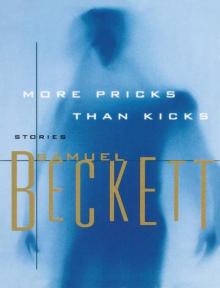 More Pricks Than Kicks
More Pricks Than Kicks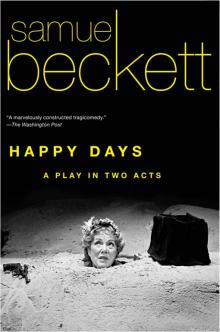 Happy Days
Happy Days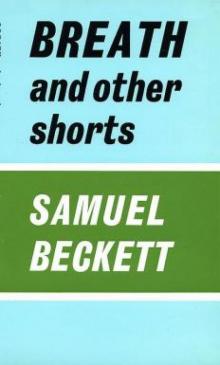 Breath, and Other Shorts
Breath, and Other Shorts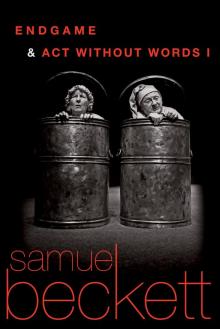 Endgame & Act Without Words
Endgame & Act Without Words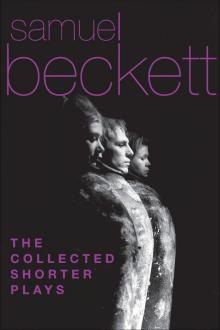 The Collected Shorter Plays of Samuel Beckett
The Collected Shorter Plays of Samuel Beckett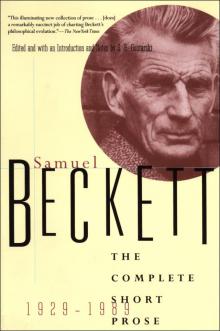 The Complete Short Prose, 1929-1989
The Complete Short Prose, 1929-1989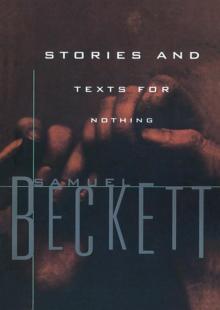 Stories and Texts for Nothing
Stories and Texts for Nothing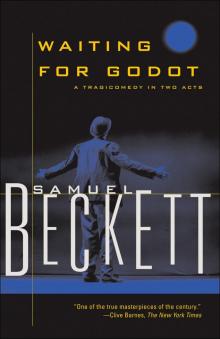 Waiting for Godot
Waiting for Godot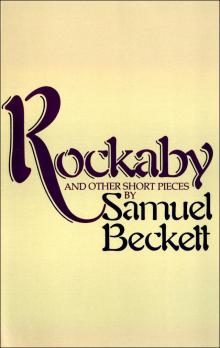 Rockaby and Other Short Pieces
Rockaby and Other Short Pieces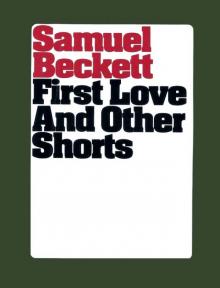 First Love and Other Shorts
First Love and Other Shorts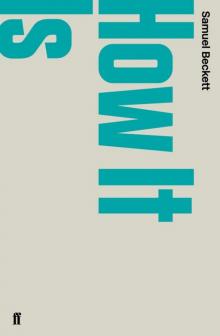 How It Is
How It Is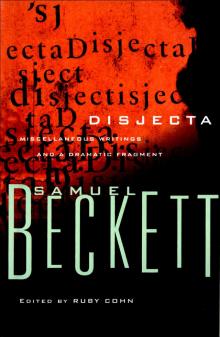 Disjecta: Miscellaneous Writings and a Dramatic Fragment
Disjecta: Miscellaneous Writings and a Dramatic Fragment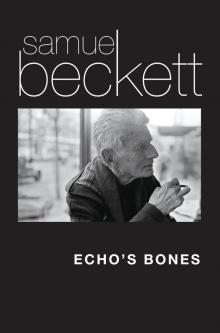 Echo's Bones
Echo's Bones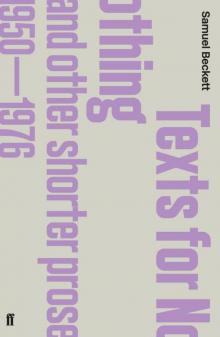 Texts for Nothing and Other Shorter Prose 1950-1976
Texts for Nothing and Other Shorter Prose 1950-1976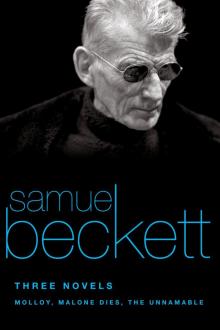 Three Novels
Three Novels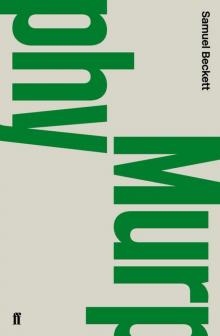 Murphy
Murphy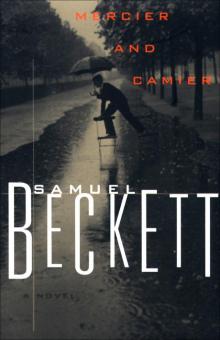 Mercier and Camier
Mercier and Camier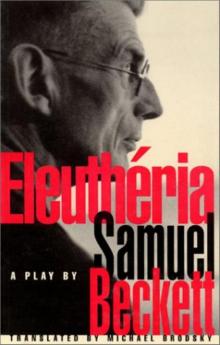 Eleuthéria
Eleuthéria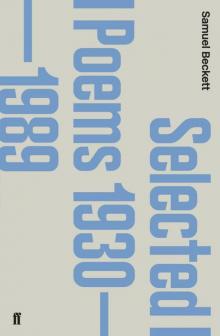 Selected Poems 1930-1988
Selected Poems 1930-1988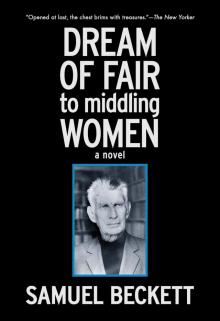 Dream of Fair to Middling Women
Dream of Fair to Middling Women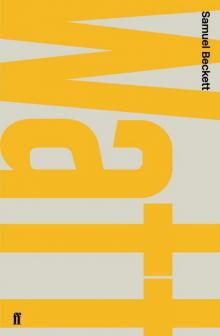 Watt
Watt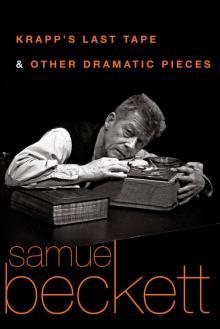 Krapp's Last Tape and Other Dramatic Pieces
Krapp's Last Tape and Other Dramatic Pieces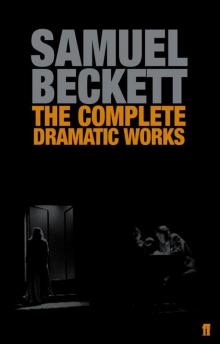 The Complete Dramatic Works of Samuel Beckett
The Complete Dramatic Works of Samuel Beckett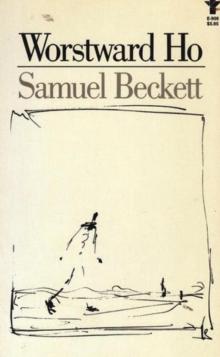 Worstward Ho
Worstward Ho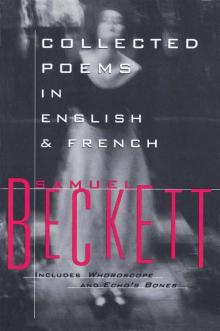 Collected Poems in English and French
Collected Poems in English and French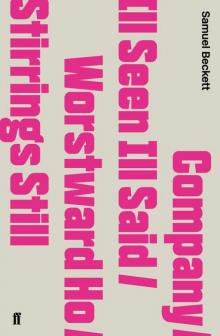 Company / Ill Seen Ill Said / Worstward Ho / Stirrings Still
Company / Ill Seen Ill Said / Worstward Ho / Stirrings Still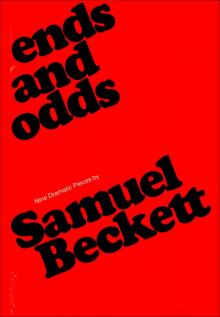 Ends and Odds
Ends and Odds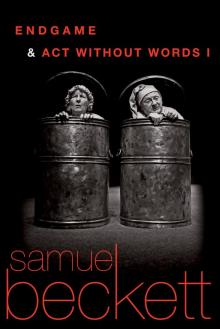 Endgame Act Without Words I
Endgame Act Without Words I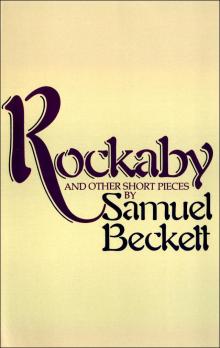 Rockabye and Other Short Pieces
Rockabye and Other Short Pieces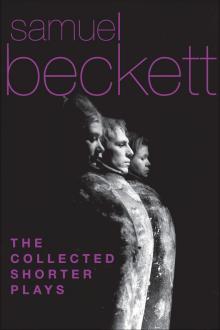 The Collected Shorter Plays
The Collected Shorter Plays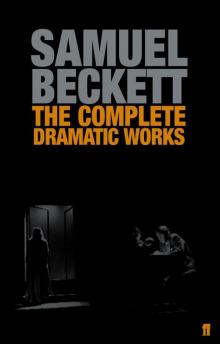 The Complete Dramatic Works
The Complete Dramatic Works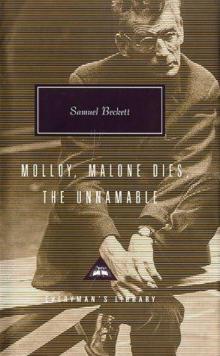 Three Novels: Malloy, Malone Dies, The Unnamable
Three Novels: Malloy, Malone Dies, The Unnamable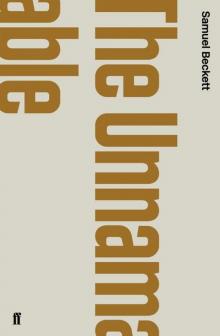 The Unnamable
The Unnamable